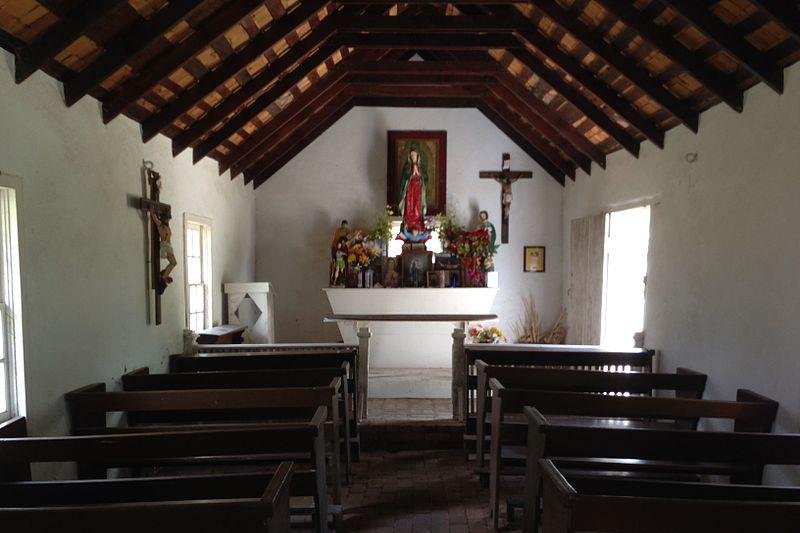MEXICO CITY, Feb. 7 (UPI) -- The South Texas border wall is one step closer to construction after a federal judge ruled government surveyors can access the historic La Lomita Chapel over objections from its landowners, the Catholic Diocese of Brownsville.
"I'm not surprised," nearby landowner Rey Anzalduas said of the judge's decision Wednesday to grant the government access to diocese-owned land. Anzalduas' family has land nearby, has lost hundreds of acres to government projects and is set to lose more to construction of a wall along the Mexico border.
"They don't give us any due process or equal protection under the law," Anzalduas said. "It's a given that every time we go to court, we are going to lose."
Congress appropriated funds last March to construct a border barrier along 33 miles in South Texas. The Catholic Diocese of Brownsville owns land in Hidalgo County, where 25 miles of this border wall is to be built soon.
To construct the barrier on private property, the government regularly uses eminent domain to seize and condemn land. Objecting landowners file lawsuits to protect their land, some of which, like that belonging to the Anzalduases and the Catholic Church, has been in their possession for centuries.
Some lawsuits filed during the Bush administration over the seizing of land for earlier wall construction are still pending. The legal challenges didn't block construction, but focus on compensation for landowners.
"They already did the surveys on our property," Anzalduas said, "but we are going to court on Tuesday over how much compensation we are going to get for the trespass. We met with a U.S. attorney last week, and he told us the only thing we could fight was how much money we would get for the lost property."
'Where's the outrage?'
Anzalduas called this situation "un-American," asking "Where's the outrage? We are also Texans and Americans. Are we less American because we live on the border? What's going on here? Is it politics or racism?"
"We always denied them access until they showed us a court order saying they could trespass," Anzalduas said. So "the U.S. government went to court for an order saying that they could trespass on our property."
Bishop Daniel Flores leads the Diocese of Brownsville, and like the Anzalduas family, he did not give the government the right to access land to perform surveys.
Granting surveyors access to private property is the first necessary step in the process of seizing land using eminent domain -- something Flores has wanted to avoid so visitors to the chapel could continue to worship there unimpeded. Flores' refusal to consent to a survey led the government to sue the diocese in the U.S. District Court for the Southern District of Texas.
"The bishop refused consent because the building of the border wall is contrary to Catholic principles of the universality of human relations, and because the border wall itself will pose risks to the lives of those who are trying to cross the border," said Amy Marshak, a lawyer with the Georgetown University Law Center's Institute for Constitutional Advocacy and Protection in Washington, D.C. She represents the diocese.
U.S. District Judge Randy Crane disagreed with Flores' lawyers who claimed the survey work would pose a "substantial burden" on chapel visitors, and agreed with the government it was entitled to conduct the survey.
The bishop has said he will comply with the court order to grant government surveyors access. Under the ruling's terms, the government must consult with the diocese about when surveyors can access the land, ensuring no impediments to using the chapel for worship.
Crane's ruling suggests private landowners face an uphill battle to stave off more border wall construction in South Texas. More than 100 private landowners will be affected by the upcoming construction near McAllen.
More lawsuits are expected. Land ownership is a touchy issue for Texans.
"There's a thing in Texas we care about called private property rights," U.S. Rep. Will Hurd, R-Texas, told Rolling Stone. Texas has 1,200 of the 1,951 miles of the U.S.-Mexico border, with Hurd's district encompassing 820 miles of it.
Hurd said the federal government might have to seize land from 1,000 landowners to build the wall. While he is one of many legislators who oppose the wall, he is the only Republican legislator with a district on the border.
'No-man's land'
Since it cannot be built on the international boundary at the river or in its floodplain, the border wall is being erected between 1 and 2 miles from the river. Plans for current border wall construction in South Texas show it will bisect thousands of acres of private land. Anzalduas calls what's left behind the wall and up to the river a "no-man's land."
That means La Lomita Chapel will be in the United States but behind the border wall -- a situation the bishop opposes, Marshak said. That is because visitors will not have unimpeded access, thereby violating their right to worship under the Religious Freedom Restoration Act and the First Amendment, she said.
"The land on the river side of the wall is basically useless," Anzalduas said. "The value goes way down on this property." It becomes inaccessible, except through gates controlled by the Border Patrol, he said, and "probably will be a staging area for illegal activity."
The government plans to break ground on 6 miles of border fencing just outside McAllen this week, mostly on National Wildlife Reserve land it owns. But the imminent construction also affects the privately owned National Butterfly Center, where heavy digging equipment arrived Sunday.
"It's a bad situation," Anzalduas said. "They are basically telling you we are going to do what the heck we want and you have no recourse at all."
https://www.upi.com/Top_News/US/2019/02/07/Court-rules-for-US-in-chapels-battle-over-South-Texas-border-wall/5361549496348/


